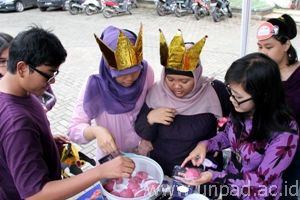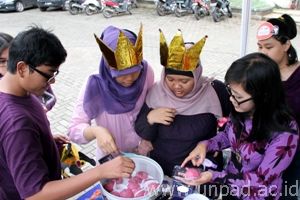[Unpad.ac.id, 05/12/2012] Ubi has been known as simply replacement for rice. But it now has the potential to be developed into more advanced food products. This is evident in the creative products students of Food Engineering departments have created, exhibited in ‘Launching Produk Kampung Ubi, Wednesday (05/12) at Kopma Lot Unpad Campus in Jatinangor.

Bringing the them, ‘Digging the Potential of Yams as Nutritious Food’, the exhibition is held as part of the regular course Product Development. According to the head of the organizer, Betty D. Sofiah, yam is similar to rice, even it has bigger potential than rice. “We are here to answer the challenge that we must make use of other carbohydrate sources other than rice,” said she.
Divided into 24 groups, the students are required to come up with three products of food and beverages from yam. Prior to making the products, students are to do survey, library research, and finding the right type of yam to be developed into new food product. The results are quite varied and rewarding with interesting additional ingredients and recipes.
“The culinary products they have come up with are quite interesting. They are very creative in determining the nutrition count, packaging, and pricing,” added she.
Dwi Pria Nugraha and Ricke Rachmayati participate in the event by making Pizza Ganyong.. “This Italian food is now made of ganyong (canna edulis). We want to introduce the new ingredients that people can now use when making pizza,” said Dwi.
The event, according to the vice dean of student affairs FTIP, Bambang Nurhadi, enables the students to have the experience for future entrepreneurship. They can promote themselves through their varying creative and innovative products. “The event blends three aspects simultaneously, entrepreneurship, creativity, and academic course,” said he.
Further effort is made by publishing books on the recipes that the students have created. “This is the eighteenth time that our faculty organizes an event that blends with academic requirement. We are compiling all recipes in books so that the society can also have access to the students innovations,” he concluded.


